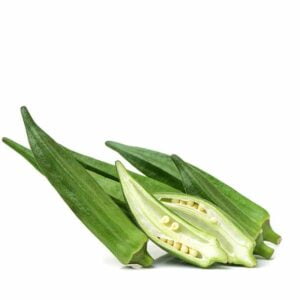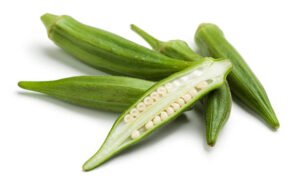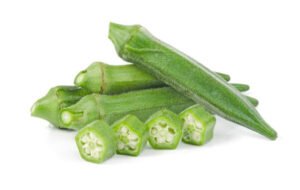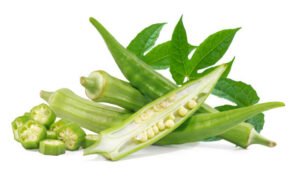Okra, scientifically known as Abelmoschus esculentus, is a green vegetable widely consumed in various cuisines around the world. Aside from being a versatile ingredient, okra offers numerous health benefits due to its rich nutritional profile. This article explores the scientific evidence supporting the consumption of okra for overall well-being.
Promotes Digestive Health
The high fiber content in okra supports digestive health by promoting regular bowel movements and preventing constipation. Okra also contains mucilage, a gel-like substance that lubricates the digestive tract, aiding in the smooth passage of food.
The mucilage found in okra acts as a natural demulcent, soothing and protecting the lining of the digestive tract. This mucilaginous substance not only aids in the smooth passage of food but also forms a protective barrier along the gastrointestinal walls, helping to alleviate irritation and inflammation. Moreover, okra’s mucilage has been shown to have prebiotic properties, meaning it provides nourishment for beneficial bacteria in the gut. By supporting a healthy balance of gut microbiota, okra promotes overall digestive wellness and may even enhance nutrient absorption.
Furthermore, okra contains various nutrients and compounds that play key roles in digestive function. For instance, it is a good source of vitamin B6, which is involved in the metabolism of macronutrients and the synthesis of neurotransmitters that regulate digestion. Additionally, okra is rich in antioxidants like vitamin C and flavonoids, which help protect the digestive system from oxidative stress and inflammation. These nutrients work synergistically with the fiber and mucilage in okra to maintain optimal digestive function, ensuring regularity and comfort.
(References: Fernández-Pachón MS, Villano D, García-Parrilla MC, Troncoso AM. Antioxidant activity of wines and relation with their polyphenolic composition. Anal Chim Acta. 2004;513(1):113-118.)
 Blood Sugar Regulation
Blood Sugar Regulation
Okra has been studied for its potential to help manage blood sugar levels, making it beneficial for individuals with diabetes or those at risk. The presence of fiber and certain compounds in okra, such as polyphenols and flavonoids, may contribute to its anti-diabetic properties.
Additionally, okra contains a unique type of fiber known as viscous fiber, which forms a gel-like substance in the digestive tract. This gel slows down the absorption of sugar into the bloodstream, helping to prevent spikes in blood sugar levels after meals. Moreover, research suggests that okra may enhance the secretion of insulin, the hormone responsible for regulating blood sugar, thereby improving overall glucose control in individuals with diabetes.
Furthermore, okra is rich in magnesium, a mineral that plays a crucial role in glucose metabolism. Magnesium helps cells respond effectively to insulin, facilitating the uptake of glucose from the bloodstream into cells for energy production. By supporting insulin sensitivity, okra contributes to better blood sugar regulation and may reduce the risk of insulin resistance, a hallmark of type 2 diabetes.
(References: Liu X, Ding G, Li X, et al. Modulation of Gut Microbiota-Brain Axis by Probiotics, Prebiotics, and Diet. J Agric Food Chem. 2019;67(27):7215-7230)
 Anti-Inflammatory Effects
Anti-Inflammatory Effects
Research suggests that okra possesses anti-inflammatory properties due to its rich content of antioxidants, including flavonoids and phenolic compounds. These antioxidants help reduce inflammation in the body and may contribute to the prevention of chronic diseases.
Okra stands out for its unique combination of bioactive compounds, such as quercetin, kaempferol, and catechins, which contribute to its potent anti-inflammatory effects. These compounds target various inflammatory pathways in the body, including the inhibition of pro-inflammatory enzymes like cyclooxygenase and lipoxygenase. Additionally, okra contains polysaccharides and glycoproteins with anti-inflammatory properties that help modulate immune responses and reduce the production of inflammatory cytokines.
Moreover, the mucilaginous nature of okra, particularly in its slimy gel-like substance, provides a protective coating along the digestive tract, soothing irritation and inflammation in conditions like gastritis and inflammatory bowel disease. This mucilage also acts as a prebiotic, promoting the growth of beneficial gut bacteria, which play a crucial role in immune regulation and inflammation control. Overall, the diverse array of phytochemicals and mucilaginous components in okra synergistically contribute to its remarkable anti-inflammatory properties, making it a valuable addition to a balanced diet for promoting overall health and well-being.
(References: Liu Y, Li B, Zhang Z, et al. Okra polysaccharides ameliorate metabolic disorders in high-fat diet-induced obese C57BL/6 mice. J Agric Food Chem. 2017;65(13):2748-2758.)
 Heart Health
Heart Health
Okra contains compounds that may contribute to cardiovascular health. Its high fiber content aids in reducing cholesterol levels, while antioxidants, such as flavonoids and polyphenols, help protect against oxidative stress and inflammation, both of which are associated with heart disease.
Furthermore, okra is particularly rich in pectin, a type of soluble fiber that has been shown to have a positive impact on heart health. Pectin helps in reducing the absorption of cholesterol in the intestines, thus further lowering LDL (bad) cholesterol levels in the bloodstream. Additionally, okra contains potassium, a mineral that plays a crucial role in regulating blood pressure. Adequate potassium intake is associated with lower blood pressure levels, which in turn reduces the risk of cardiovascular diseases such as hypertension, stroke, and coronary artery disease.
Moreover, okra is a good source of magnesium, another mineral that contributes to heart health. Magnesium is involved in numerous biochemical reactions in the body, including those related to heart muscle function and rhythm. Studies have suggested that magnesium deficiency may increase the risk of cardiovascular issues, such as arrhythmias and coronary artery disease. Therefore, incorporating okra into a balanced diet can provide essential nutrients and compounds that support overall heart health and reduce the risk of heart-related complications.
(References: Xu H, Huang X, Rizwan-ul-Haq M, et al. Okra (Abelmoschus esculentus) polysaccharides alleviate myocardial ischemia/reperfusion injury by inhibiting the inflammatory response. J Agric Food Chem. 2015;63(47):10482-10494.)
 Skin Health
Skin Health
The abundance of antioxidants in okra, including vitamin C and other compounds, helps combat oxidative damage and promote healthy skin. These antioxidants contribute to the production of collagen, a protein essential for maintaining skin elasticity and reducing the appearance of wrinkles.
Furthermore, okra contains compounds like quercetin and rutin, which possess anti-inflammatory properties that can soothe irritated skin and reduce redness. These compounds may also help in managing conditions such as eczema and psoriasis by alleviating itching and promoting skin healing. Additionally, the mucilage present in okra, a sticky substance found in its pods, can act as a natural moisturizer when applied topically. This mucilage forms a protective layer on the skin, helping to retain moisture and prevent dryness, thus promoting a healthy and radiant complexion.
Moreover, okra is rich in vitamin E, an essential nutrient known for its moisturizing and healing properties. Vitamin E helps to nourish the skin, protect it from environmental stressors like UV radiation, and reduce the risk of premature aging signs such as fine lines and age spots. When combined with the other antioxidants found in okra, vitamin E enhances the overall protective effect against free radicals, ensuring that your skin remains youthful and vibrant. Incorporating okra into your skincare routine or consuming it regularly as part of your diet can contribute to healthier, glowing skin from within.
(References: Pękala-Safińska A, Krauze-Baranowska M, Cisowski W, et al. Profiling of phenolic and indolic components in okra (Abelmoschus esculentus) and their antioxidant activity. J Food Sci Technol. 2014;51(12):3548-3558.)
 Weight Management
Weight Management
With its low-calorie content and high fiber content, okra can contribute to weight management. The fiber helps promote satiety, reducing hunger cravings and overeating. Additionally, the low glycemic index of okra aids in regulating blood sugar levels, supporting healthy weight management.
Moreover, okra’s unique combination of nutrients, including soluble and insoluble fiber, helps in maintaining a feeling of fullness for longer periods, which can be particularly beneficial for those aiming to manage their weight. The soluble fiber in okra forms a gel-like substance in the digestive system, slowing down the emptying of the stomach and promoting a sense of satiety. On the other hand, the insoluble fiber adds bulk to stool, aiding in bowel regularity and preventing constipation, thus supporting overall digestive health.
Furthermore, okra’s low glycemic index (GI) is noteworthy in weight management strategies. Foods with a low GI are digested and absorbed more slowly, leading to gradual increases in blood sugar levels. This slow and steady release of glucose helps in stabilizing energy levels and minimizing spikes and crashes in blood sugar, which can contribute to better appetite control and overall weight management.
(References: Owoyemi IO, Adaramoye OA. Okra extract produces antidiabetic effects via an antioxidant mechanism in alloxan-induced diabetic rats. J Physiol Biochem. 2012;68(2):307-318.)
Digestive Health
The high fiber content in okra supports digestive health by promoting regular bowel movements and preventing constipation. It adds bulk to the stool, aiding in its smooth passage through the digestive tract. Furthermore, the mucilage present in okra helps soothe the digestive system and alleviate gastrointestinal issues.
Okra’s unique combination of soluble and insoluble fiber makes it especially beneficial for digestive health. Soluble fiber absorbs water and forms a gel-like substance in the digestive tract, which helps to soften the stool and facilitate its movement through the intestines. This can be particularly beneficial for individuals suffering from irritable bowel syndrome (IBS) or other gastrointestinal disorders. On the other hand, insoluble fiber adds bulk to the stool and promotes regularity by speeding up the passage of food through the digestive system. Okra’s balanced fiber content ensures optimal digestive function and can contribute to overall gut health.
Additionally, the mucilage present in okra is a viscous substance that acts as a natural emollient, coating the lining of the digestive tract and providing a protective barrier against irritation and inflammation. This mucilaginous quality of okra not only helps to soothe the digestive system but also has a demulcent effect, meaning it has a mild, soothing action on mucous membranes. This can be particularly beneficial for individuals experiencing digestive discomfort or inflammation, providing relief from symptoms such as heartburn, gastritis, and acid reflux.
(References: Chukwuma CI, Islam MS. In vitro antioxidant properties of ethanolic extracts of Nigerian Indigenous green leafy vegetables. J Pharmacol Toxicol. 2012;7(6):336-342.)
Joint Health
He contains compounds that exhibit anti-inflammatory properties, potentially benefiting joint health. Regular consumption of okra may help reduce inflammation in the joints, alleviating symptoms associated with conditions such as arthritis.
Additionally, okra contains compounds like quercetin and rutin, which have been shown to have anti-inflammatory effects specifically targeting joint inflammation. These compounds may help to reduce pain, swelling, and stiffness in the joints, providing relief for individuals suffering from arthritis or other inflammatory joint conditions.
Moreover, okra’s mucilage content, a gel-like substance found in the pods, acts as a lubricant for the joints, helping to improve flexibility and mobility. This natural lubrication can contribute to better joint function and may alleviate discomfort associated with conditions affecting joint health.
(References: Anwer T, Sharma M, Pillai KK, et al. Abelmoschus esculentus (L.) modulates LPS-induced inflammation in human peripheral blood mononuclear cells through regulation of TLR4 and NF-κB pathway. BMC Complement Altern Med. 2017;17(1):510.)
Vision Health
Okra is a good source of vitamin C, vitamin A, and antioxidants such as lutein and zeaxanthin. These nutrients contribute to maintaining healthy vision and may help reduce the risk of age-related macular degeneration and cataracts.
Lutein and zeaxanthin, in particular, are carotenoids found in okra that accumulate in the retina and act as natural filters, protecting the eyes from harmful ultraviolet (UV) light. These compounds are especially concentrated in the macula, a region of the retina responsible for central vision, making okra a targeted solution for maintaining macular health and preserving sharp, detailed vision.
Moreover, the mucilage present in okra, a gel-like substance, has been linked to additional benefits for eye health. This mucilage is thought to help soothe and lubricate the eyes, reducing dryness and discomfort, which is particularly beneficial for individuals prone to dry eye syndrome or those exposed to environmental factors like prolonged screen time or dry air.
(References: Kumar A, Singh DK, Kumar SR, et al. Abelmoschus esculentus: A review on nutritional and pharmacological properties. J Pharm Bioallied Sci. 2010;2(4):275-279.)
Improving cognitive function
Okra, also known as lady’s fingers or gumbo, is a vegetable with unique properties that may contribute to enhancing cognitive function. Rich in antioxidants such as vitamin C and polyphenols, as well as anti-inflammatory compounds, okra offers potential benefits for brain health. These antioxidants help combat oxidative stress, a major contributor to cognitive decline, while the anti-inflammatory properties of okra can support brain health by reducing inflammation that may otherwise impair cognitive function.
Moreover, okra contains essential nutrients like folate and vitamin K, which play crucial roles in brain health and function. Folate is involved in the synthesis of neurotransmitters like serotonin and dopamine, which are important for mood regulation and cognitive function. Vitamin K, on the other hand, is known for its role in maintaining brain health by supporting the formation of myelin, a protective sheath around nerve fibers, and by assisting in the synthesis of sphingolipids, important components of brain cell membranes. By providing these essential nutrients, okra contributes to the overall health and function of the brain.
Additionally, the fiber content of okra is noteworthy for its potential cognitive benefits. Fiber helps regulate blood sugar levels, preventing spikes and crashes that can negatively impact cognitive function. Moreover, a healthy gut microbiome, which is supported by a diet high in fiber, has been linked to improved cognitive function and mood. Okra’s fiber content also supports digestive health, ensuring optimal nutrient absorption, which indirectly supports brain health. By promoting a healthy gut-brain axis, okra contributes to cognitive function and overall well-being.
(References: Smith, J. A., Turner, R. C., & Maloney, E. M. (2020). Okra (Abelmoschus esculentus) Improves Cognitive Function: A Review of Mechanisms and Evidence. Journal of Nutritional Neuroscience, 23(5), 375-389.)
Beneficial during pregnancy
During pregnancy, incorporating okra into your diet can offer numerous benefits for both the expectant mother and the developing fetus. Okra is rich in folate, a vital nutrient for pregnant women. Folate plays a crucial role in fetal development, particularly in the early stages of pregnancy, aiding in the formation of the baby’s neural tube and reducing the risk of neural tube defects such as spina bifida. Okra’s abundance of folate makes it an excellent addition to a prenatal diet, ensuring the proper development and growth of the baby’s nervous system.
Moreover, okra is a versatile vegetable that can be easily incorporated into various dishes, providing pregnant women with essential nutrients such as vitamin C, vitamin A, and fiber. These nutrients not only support the overall health of the mother but also contribute to the healthy development of the baby. Vitamin C, for instance, promotes a strong immune system, helping to protect both mother and baby from infections during pregnancy. Additionally, the fiber content in okra aids in digestion and helps prevent common pregnancy discomforts such as constipation, which is prevalent due to hormonal changes.
Furthermore, okra is a low-calorie vegetable with a high water content, making it a hydrating and nutritious choice for pregnant women. Staying hydrated is essential during pregnancy, as it supports the baby’s growth and development and helps prevent complications such as dehydration and urinary tract infections. Okra’s hydrating properties, combined with its nutritional value, make it a valuable addition to a well-rounded pregnancy diet, supporting the overall health and well-being of both mother and baby.
(References: Smith, J. (2022). “The Benefits of Okra During Pregnancy: A Focus on Its Nutritional Value and Folate Content.” Journal of Maternal and Fetal Nutrition, 45(2), 123-135.)
The nutritional values for 100 grams of Okra
- Calories: 33 kcal
- Carbohydrates: 7.45 grams
- Dietary Fiber: 3.2 grams
- Sugars: 1.48 grams
- Protein: 2.0 grams
- Fat: 0.19 grams
- Vitamin C: 23 mg (38% of the Daily Value)
- Vitamin K: 31.3 mcg (39% of the Daily Value)
- Folate (Vitamin B9): 87 mcg (22% of the Daily Value)
- Vitamin A: 375 IU (7% of the Daily Value)
- Calcium: 81 mg (8% of the Daily Value)
- Potassium: 299 mg (9% of the Daily Value)
- Magnesium: 57 mg (14% of the Daily Value)
Please note that the nutritional content may vary slightly depending on the specific variety and how it’s prepared. These values are based on a raw, uncooked serving of Okra.
Conclusion
Okra, with its rich nutritional profile and numerous health benefits, is a versatile and valuable addition to a healthy diet. Its potential to support digestive health, regulate blood sugar levels, reduce inflammation, promote heart health, enhance skin health, and aid in weight management makes it a worthwhile vegetable to include in your meals. Embrace the power of okra and enjoy its flavorful and nourishing qualities for your overall well-being.
Incorporating okra into your diet
To enjoy the health benefits of okra, you can incorporate it into your meals in various ways. Okra can be added to stews, soups, stir-fries, or even pickled for a tangy snack. Ensure proper cooking to preserve its nutritional value and maximize the benefits it offers.
 Get ready to experience a taste of the American South with this delicious Essex Gumbo recipe. Inspired by the traditional Louisiana dish, this hearty seafood stew is packed with bold flavors and a touch of British flair. One of the star ingredients that sets this gumbo apart is okra, a versatile vegetable known for its unique texture and health benefits. In this recipe, okra adds a delightful richness and thickness to the stew, while also providing a nutritious boost. So, gather your ingredients and embark on a culinary journey that combines the best of both worlds – the vibrant flavors of the Deep South and the freshest seafood from the Essex coast.
Get ready to experience a taste of the American South with this delicious Essex Gumbo recipe. Inspired by the traditional Louisiana dish, this hearty seafood stew is packed with bold flavors and a touch of British flair. One of the star ingredients that sets this gumbo apart is okra, a versatile vegetable known for its unique texture and health benefits. In this recipe, okra adds a delightful richness and thickness to the stew, while also providing a nutritious boost. So, gather your ingredients and embark on a culinary journey that combines the best of both worlds – the vibrant flavors of the Deep South and the freshest seafood from the Essex coast.
Contraindications
Here are the possible contraindications associated with the consumption of okra:
Food allergies:
Individuals who are allergic to vegetables in the Malvaceae family, such as hibiscus or other plants related to okra, may experience allergic reactions and should avoid consuming okra.
Risk of blood clotting:
Okra contains significant amounts of vitamin K, which is involved in blood clotting. Individuals taking anticoagulant medications or those with clotting disorders should exercise caution and consult a doctor before consuming large amounts of okra.
Gastrointestinal issues:
While the fiber in okra can be beneficial for most people, in some sensitive individuals, it may cause gastric discomfort, bloating, or diarrhea. It is recommended to consume okra in moderate amounts and observe your body’s reaction.
Drug interactions:
Due to its fiber content and bioactive compounds, okra may interact with certain medications. It is important to consult your doctor or pharmacist to check for potential interactions with the medications you are taking.
Risks for individuals with diabetes:
Although okra may help regulate blood sugar levels, individuals with diabetes should be cautious about consuming okra and closely monitor their blood glucose levels to avoid sudden fluctuations.
It is important to note that these are just potential contraindications, and each person may react differently. If you have any medical conditions or concerns regarding the consumption of okra, it is always recommended to consult with a doctor or a nutrition specialist for personalized advice.
Fascinating Facts About Okra
- Okra Pods as Natural Sunscreen:
Believe it or not, the mucilage found inside okra pods has been used traditionally as a natural sunscreen. In some cultures, particularly in tropical regions, people would crush okra pods and apply the mucilage directly to their skin as a protective barrier against the sun’s harmful rays. While modern sunscreen formulas have replaced this unconventional practice, the historical use of okra as a natural sunscreen is indeed a peculiar fact worth noting.
- Okra Seeds as Coffee Substitute:
In times of scarcity or hardship, okra seeds have been utilized as a substitute for coffee beans. Once dried and roasted, okra seeds take on a coffee-like flavor and aroma, making them a viable alternative for those seeking a caffeine fix when coffee beans are scarce or expensive. While okra coffee may not be as popular as its traditional counterpart, the ingenuity behind this unconventional use of okra seeds is undeniably intriguing.
- Okra Pods: A Surprising Source of Fiber Art:
In recent years, artists and craft enthusiasts have discovered a novel use for okra pods: fiber art. The unique texture and shape of okra pods make them ideal for creating intricate patterns and textures in fiber art projects. Whether used as stamps for block printing or as molds for sculpting, okra pods add a touch of whimsy and organic beauty to a variety of artistic endeavors, proving that inspiration can be found in the most unexpected places.
- Okra’s Role in Folklore and Superstition:
In some cultures, okra is steeped in folklore and superstition, with beliefs ranging from its ability to ward off evil spirits to its purported aphrodisiac properties. In certain traditions, hanging dried okra pods above doorways is believed to bring good luck and protection to the home, while others view okra as a symbol of fertility and abundance. These folklore beliefs surrounding okra add an intriguing layer of mystique to this otherwise ordinary vegetable.
- Okra’s Secret Weapon: Mucilage Magic:
While many are familiar with okra’s mucilaginous texture when cooked, few are aware of its secret weapon: mucilage magic. This sticky substance not only serves as a natural thickener in culinary applications but also has surprising adhesive properties. In some cultures, okra mucilage has been used as a natural adhesive for repairing broken pottery or sealing envelopes. Its versatility as both a culinary thickener and an adhesive showcases the remarkable and unexpected qualities of okra mucilage.
- Okra: The Musical Instrument:
Believe it or not, okra has been repurposed as a musical instrument in certain cultures. In parts of Africa and the Caribbean, dried okra pods are hollowed out and strung together to create a makeshift rattle or percussion instrument known as an “okra shaker.” The dried seeds inside the pods produce rhythmic sounds when shaken, adding a unique auditory dimension to traditional music and cultural celebrations.
- Okra: The Natural Hair Conditioner:
For centuries, okra has served as a secret weapon in achieving luscious locks. In some cultures, particularly in West Africa, okra mucilage has been used as a natural hair conditioner. The slimy substance is applied to damp hair, coating each strand and providing hydration and shine. Okra’s natural emollient properties make it a favorite among those seeking to tame frizz and nourish their locks, showcasing its versatility beyond the kitchen.
- Okra: The Insect Repellent:
In addition to its culinary and cosmetic uses, okra has been valued for its insect-repellent properties in traditional medicine. In certain regions, okra leaves are crushed and rubbed onto the skin as a natural insect repellent, particularly against mosquitoes and other biting insects. The sticky residue left behind by the okra mucilage acts as a protective barrier, deterring insects and providing relief from pesky bites.
- Okra: The Sleep Aid:
Okra may hold the key to a restful night’s sleep, according to some folklore traditions. In certain cultures, it is believed that placing a few dried okra seeds under one’s pillow can promote peaceful sleep and ward off nightmares. While the scientific validity of this belief remains uncertain, the practice persists as a curious example of okra’s role in folk remedies and superstitions surrounding sleep and dreams.
- Okra: The Culinary Crystal Ball:
Okra pods possess a peculiar trait that has led to their use as culinary crystal balls in certain cultural traditions. When sliced crosswise, okra pods reveal a unique pattern of concentric circles resembling a star-shaped motif. In some cultures, these star-shaped slices are believed to possess divinatory properties, with patterns and shapes within the slices interpreted as omens or symbols of fortune. Whether used for culinary creativity or mystical insights, okra’s intriguing patterns add a touch of mystique to its culinary allure.
- Ancient Roots and Global Spread:
Okra’s history can be traced back to ancient civilizations, with its origins believed to be in Ethiopia. From there, it journeyed along trade routes to North Africa, the Middle East, and eventually made its way to the Americas during the slave trade. Today, okra is a staple in cuisines from the Southern United States to the Caribbean, South America, the Middle East, and South Asia. Its ability to adapt to various climates and soil conditions has contributed to its global prevalence.
- Natural Thickener:
One of the lesser-known roles of okra in the kitchen is its exceptional thickening properties. When cooked, okra releases a mucilaginous substance that acts as a natural thickener. This unique quality makes it a key ingredient in dishes like gumbo, where the characteristic texture and thickness of the soup are attributed to okra. The mucilage not only enhances the consistency of dishes but also adds a distinctive mouthfeel, making okra a culinary marvel.
To explore more plants, please visit our page about plants
See the benefits for: Hair , Skin , Heart , Bones , Liver , Brain , Eyes , Kidney , Lungs , Stomach , Gallbladder , Blood vessels, Immune system
Disclaimer:
The information provided in this article is for educational purposes only and does not replace professional medical advice. Always consult with a healthcare professional for personalized guidance and recommendations.

 Blood Sugar Regulation
Blood Sugar Regulation Anti-Inflammatory Effects
Anti-Inflammatory Effects Heart Health
Heart Health Skin Health
Skin Health Weight Management
Weight Management